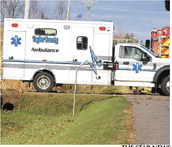County forest gravel bids came in lower than expected
Taylor County got better than expected bids for gravel for county forest road projects scheduled for this summer.
“We did exceptionally well in our gravel bidding,” said county forest administrator Jake Walcisak. The county had budgeted $42,000 for the road gravel and the low bid for the project of the three bids received was $29,595.
Walcisak noted that this came out to about $2.50 less per yard than what the county purchased last year.
Committee members approved the low bid from Haas Sons of Thorp. Committee member Jim Gebauer noted the price the county received was below the recent bids approved by the Greenwood town board for their summer projects.
Walcisak noted that typically the county forest bids end up slightly higher than the town prices because the volume is lower and forest logging roads are narrower making access more challenging.
Budget review update
Walcisak reported on attending the recent budget review session as part of the county’s ongoing efforts to reduce the overall county budget by $500,000.
Walcisak said potential alternative revenue streams to boost county revenues would be to explore enrolling the county forest into carbon offset projects and to look at allowing maple syrup operations to locate on the forest.
Walcisak said in the first round of exploration for the carbon offset programs, where companies pay to use the county forest lands to earn carbon offset credits, the county’s 18,000 acres were considered too small to be worth it. Now however, Walcisak said he was approached by the developers saying they had captured the low-hanging fruit and that the smaller county forests could fit into their business models. This has the potential of bringing in $2.5 million in new revenue without impacting how the county manages or harvests timber from the forest.
Walcisak said they are also looking at maple syrup operations, noting Bayfeld county allows this and that syrup operations are allowed on Bureau of Public Lands managed state forests.
He noted that with logging, the county averages about $39 to $40 per acre in revenue while in a good year a syrup operation could generate $60 plus, per acre.
Committee member Gary Beadles cautioned against allowing the maple syrup operations noting that tapping the trees impacts the quality of the wood that can be harvested. He said the wood from tapped trees is reduced to pulpwood quality.
In other business, committee members:
Approved closing out timber sale 675 pending the final hauling and payments. According to assistant county forest administrator Jordan Lutz, this was one of the older sales on the county’s books with it established first in 2014 and then rebid in 2019. He reported the sale was about 9% below estimated in volume and 1% below in overall value. He explained that the goal is to be within 20% of the estimate.
Received an update on the dam projects planned for this summer. Committee members were invited to visit the Chelsea Dam location for a pre-construction meeting with the adjoining property owner. Walcisak noted the project calls for the lake level to be lowered by about six includes during construction. The Camp 8 flowage will be lowered to just the creek bed over the course of a month beginning around July 1. A local sportsman organization has expressed interest in making fishing improvements to Camp 8 Flowage including the potential for fish habitat and fishing piers.
Met in closed session for a personnel issue regarding expenses submitted for the Wisconsin County Forest Association meeting held in Rothschild March 22 and March 23. After the committee voted to go into closed session, Walcisak said, “I respectfully request it be held in open season.” However county board member Mike Bub, who along with board member Lynn Rosemeyer, attended the meeting, told the committee that since they had already voted to go into closed session they had to do so, but that it did not prevent Walcisak from making a statement, if he wanted to do so, after the closed session. Following the closed session committee members voted to approve what had been approved in the closed session and declined to go into any further detail what that decision was.



